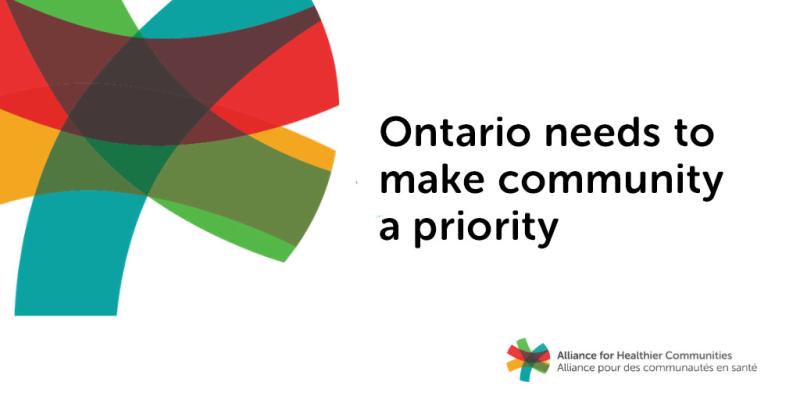
On November 5, 2020, the provincial government released its annual budget, which further builds on its COVID-19 Action Plan to Protect, Support and Recover, and contains a multi-year forecast. Overall, there are $45 billion in investments, many of which were previously announced.
Although this budget focused heavily on addressing immediate impacts of the COVID-19 pandemic through increasing acute care and long-term care capacity and supporting businesses, the Alliance is concerned at the lack of clarity about specific supports for marginalized people and communities. Isolated seniors, people at risk due to the overdose crisis, Black populations, Indigenous communities, people living on low incomes, and others who've borne disproportionate impacts of the pandemic are largely invisible in this budget.
We're also concerned that, although team-based primary care has been foundational in local COVID-19 responses – working with partners and local public health units to support testing, outreach, and other supports related to COVID-19 – there are few specific mentions or dedicated resources in the budget to support this work. On the whole, the budget has the right goals in mind: to support and protect people throughout the pandemic and to ensure people have what they need to get back on their feet in recovery. But in order to ensure a healthy recovery that works for everyone, much more needs to be done, particularly for those marginalized people at much higher risk of poor health outcomes both now and in recovery.
Primary Care
Primary care organizations, Alliance members among them, have played and continue to play foundational roles in people’s lives, with years of trust built between providers and communities. Particularly among marginalized communities, trust is essential to ensuring equitable COVID-19 responses, and will be especially vital when it’s time to distribute vaccines. While the government addresses some health provider costs related to the pandemic in the budget, there are few specifics as to how this will directly aid primary care providers in their operations and in managing additional costs related to the pandemic. Provincial investments are still needed for community-driven outreach and testing, flu vaccination, wrap-around social supports, virtual wellness checks, as well as core healthcare and health promotion services. Alliance members’ delivery of comprehensive primary health care is vital to keeping people healthy and safe during the pandemic, especially considering additional barriers people continue to face, and their work will be vital to healthy and sustainable community recoveries.
As recognized in a Healthy Debate article published this week, Ontario's plan to contain second wave "needs a dose of primary care engagement". The Alliance will continue to advocate with its members and sector partners for the critical work of comprehensive primary health care to be recognized and adequately resourced by this government.
Opioid and Overdose Crisis
We are very concerned about the lack of mention of the opioid poisoning and overdose crisis, safer supply, harm reduction, or any related measures to support communities. With no recognition or funding, there is no acknowledgement or plan of action in this budget for the worsening crisis and its impact on people and communities across the province. People continue to die; the rate of deaths from overdose in Ontario is the highest since the crisis worsened several years ago. Mental health and harm reduction providers need investments to address this ongoing and worsening crisis. We need concrete support for effective programs like safer supply. This work is and will continue to be an active priority for the Alliance in all our conversations with the Ministry of Health and in our continued advocacy work.
Black Health and Anti-Black Racism
When addressing the house yesterday, Ontario’s Minister of Finance Rod Phillips acknowledged that he had “been reflecting on the important conversations that have been happening in communities about anti-Black racism.” He also stated that “Ontario is a place where every person deserves respect and the opportunity to be all that they can be. Unfortunately, systemic racism and other forms of hate still get in the way, and that is simply unacceptable. In many cases, COVID-19 has exacerbated existing inequities. Important work is already underway to address these issues.”
However, aside from the welcomed increase to funding for the Black Youth Action Plan, there is no other investments being made in Black Health or anti-Black racism strategies or programs. As the Alliance laid out in our pre-budget submission to the government, creating and funding a provincial Black health strategy is essential to enabling change and addressing anti-Black racism in health care and other sectors.
Conclusion
We increasingly hear people talking about the looming “pandemic deficit”. The notion of a lack of resources during this time goes beyond the purely financial. When communities are forced to make cutbacks and deliver more services with the same funding, it’s generally marginalized people and communities who aren’t served and end up with poorer health outcomes. This budget, with its lack of any meaningful focus on community-driven solutions, primary care, interprofessional teams and the social determinants of health, leaves Ontario at risk of a “community deficit” due to COVID-19. In addition, the budget doesn’t take any meaningful action on health equity priorities, such as anti-racism or the social determinants of health (SDOH), including poverty reduction, food security, fair and stable employment, affordable housing or safer schools. The Alliance remains concerned that a lack of action and leadership from the provincial government on health equity will mean that future community deficits are felt most deeply by those who can least afford to carry more burden from the pandemic. We will continue to work with our partners to seek out action and resources on health equity.
